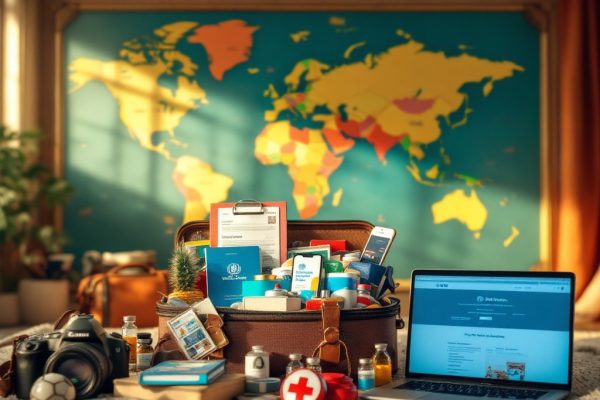What Travel Vaccines Do I Need Before the Journey
Planning an exciting trip abroad? Don’t let preventable illnesses ruin your adventure! Protect yourself and your community by learning about essential travel vaccinations. Discover how to prepare for your trip, understand recommended vaccines based on your destination and health status, and find reputable travel clinics for personalized advice. Start planning for a healthy and safe journey today!
Important information

- Consult a doctor or travel clinic 4-6 weeks before your trip to discuss your itinerary, health status, and necessary vaccinations.
- Some countries require specific vaccinations for entry (e.g., yellow fever). Check your destination’s requirements.
- Ensure all routine vaccinations are up-to-date before traveling.
- Pregnant women and individuals with weakened immune systems should consult their doctor before receiving any travel vaccinations.
- When traveling to developing countries, take extra precautions like malaria prevention and food/water safety.
Understanding Travel Vaccination Needs Before Your Journey
Before your trip, get the necessary vaccinations to protect yourself from regional diseases. Some countries require proof of vaccination, especially for yellow fever. These vaccinations not only protect you, but also contribute to public health by preventing the spread of disease. Consult a doctor or travel clinic at least four to six weeks before your departure for personalized advice. They will assess your health, age, planned activities, destination, and trip length to determine the most appropriate vaccinations. This advance planning ensures the vaccines reach full effectiveness and provides you with optimal immunity.
Consult a healthcare professional. Talk to a doctor or visit a travel clinic four to six weeks before your trip.
Get personalized advice. Your doctor will assess your health, age, planned activities, destination, and trip length to recommend the most suitable vaccinations.
Get vaccinated. Receive the necessary vaccinations to protect yourself from regional diseases, some countries require proof of vaccination (especially for yellow fever).
Ensure effectiveness. Advance planning allows the vaccines to reach full effectiveness and provides you with optimal immunity.
What Are Travel Vaccines and Why Are They Important?
Travel vaccines provide essential protection against various diseases you may encounter while traveling abroad. These vaccines safeguard you from illnesses like yellow fever, typhoid, and hepatitis A. Getting vaccinated not only protects your health but also helps prevent the spread of these diseases to others upon your return. Some countries require proof of specific vaccinations for entry, such as yellow fever. Therefore, consulting with a healthcare professional or travel clinic is crucial to determine the necessary vaccines based on your destination and health status. Travel vaccines contribute significantly to public health by minimizing the risk of outbreaks and ensuring community safety.
How International Travel Increases Health Risks
Traveling abroad can expose you to diseases like hepatitis A, hepatitis B, typhoid, yellow fever, and rabies. Consult resources like the CDC and WHO for destination-specific health advice. Some countries require vaccinations, such as yellow fever, for entry. Without recommended vaccinations, you risk contracting these illnesses and spreading them to others. Protect yourself and your community by getting vaccinated.
Why Routine Vaccines Should Be Up to Date Before Traveling
Routine vaccinations are essential for safeguarding your health, protecting you from preventable diseases that can pose greater risks when contracted abroad. Traveling often exposes individuals to illnesses not commonly found at home, making it vital to update your routine vaccines before embarking on a trip. This precaution minimizes your risk of infection and reduces the chance of spreading disease, protecting both yourself and the communities you visit. For optimal protection, consult a healthcare professional 4-6 weeks prior to your departure to ensure your vaccinations are up-to-date.
Determining the Vaccines You Need for Your Trip
Planning your trip effectively involves considering necessary vaccinations. Your destination and the length of your trip will determine the specific vaccinations you may need. Factors such as planned activities, age, current health status, and previous vaccinations should also be taken into account. Consulting a doctor or travel clinic is strongly recommended to receive personalized advice. Some countries mandate specific vaccinations for entry, while others provide recommendations based on local health risks. A healthcare professional can assess these recommendations and tailor them to your individual circumstances.
How Your Destination Influences Vaccine Requirements
Entry requirements vary based on your destination. Some countries require specific vaccinations, such as proof of yellow fever vaccination for areas where it’s prevalent. Your planned activities also influence necessary precautions; for example, a hiking trip might require different immunizations than a beach vacation. Your overall health and trip duration are also important factors. Consult a travel medicine specialist for personalized recommendations to ensure appropriate protection.
What Personal Health Factors Affect Vaccine Needs?
Your age and overall health, including any pre-existing conditions or current medications, play a crucial role in determining the right vaccines for you. A weakened immune system or chronic illness might necessitate additional vaccines or other precautions. Consulting your doctor is essential. They can evaluate your health and recommend the most appropriate vaccines. Allergies are also a key factor, so inform your doctor about any allergies to vaccine ingredients. Certain medical conditions, such as pregnancy, may restrict your vaccine options. Therefore, it’s crucial to discuss your medical history with your doctor to ensure your safety and the effectiveness of the vaccination.
Consult your doctor. Discussing your health history with your physician is the first step towards getting the right vaccinations.
Disclose your medical history. Inform your doctor about pre-existing conditions, current medications, allergies, and any other relevant health information.
Get personalized recommendations. Your doctor will evaluate your health status and suggest the most suitable vaccines for your specific needs.
Why Previous Immunizations Matter for Travel Vaccines
Consult a travel health professional to discuss your vaccination history and ensure you have the right protection for your trip. They will create a personalized vaccination plan based on your previous immunizations, maximizing your immunity and avoiding unnecessary shots. This tailored approach will effectively prepare you for the specific health risks at your destination.
Common Travel Vaccines and Their Importance
Travel vaccines are crucial for protecting your health while abroad. Some recommended vaccines include hepatitis A and B, typhoid, and yellow fever. Don’t forget routine immunizations like influenza and COVID-19. These vaccines not only protect you from illnesses while traveling but may also be required for entry into certain countries. For example, yellow fever vaccination is mandatory for entry into many African and South American countries. Hepatitis A is recommended for travel to destinations with poor sanitation, while typhoid is advisable if food or water contamination is a concern. Ensure a healthy trip by getting vaccinated.
What Are the Common Travel Vaccines You May Need?
Travel vaccines are crucial for protecting your health while abroad. Some commonly recommended vaccines include hepatitis A and B, typhoid, and yellow fever. It’s also important to stay up-to-date on routine immunizations like Tdap (tetanus, diphtheria, and pertussis) and MMR (measles, mumps, and rubella). Depending on your destination, you might need additional vaccines such as rabies, Japanese encephalitis, or meningococcal vaccines. Consult a healthcare professional or travel clinic for personalized recommendations based on your health status and travel plans.
Understanding the Yellow Fever Vaccine Requirements
A yellow fever vaccination might be mandatory for your trip. If so, visit an authorized vaccination center. Some countries require proof of vaccination for entry.
Malaria Prevention: Medicines and Vaccines
Protect yourself from malaria by taking antimalarial medication. This preventative measure involves taking medication before, during, and after your trip to a high-risk area. Consult your doctor to determine the right medication for you. Currently, there are no vaccines available to prevent malaria in travelers.
Planning Your Vaccination Schedule for Travel
Planning vaccinations for a healthy trip should start 4-6 weeks before departure. This timeframe allows your body enough time to build immunity, as some vaccines may require multiple doses or a longer period to become fully effective. Consulting a healthcare professional or travel clinic is crucial for personalized recommendations tailored to your health, destination, and planned activities. Their expertise will ensure a safe and healthy journey.
Why Vaccination Timing Matters: 4 to 6 Weeks Before Travel
Vaccines build strong immunity, typically within 4–6 weeks, the time your body needs for an effective response. Some vaccines require multiple doses spread out over weeks or months. For personalized advice, consult a doctor or nurse. If you’re traveling sooner, certain vaccines can still provide some level of protection.
How to Ensure All Vaccinations and Boosters Are Current
Review your vaccination records before your trip.
Schedule a check-up with your doctor or nurse about a month before your trip to discuss your destination and overall health.
They will review your current immunizations and determine if you need any boosters or additional vaccinations.
Where to Get Travel Vaccines and Health Advice
Planning your trip? Travel clinics provide expert advice and essential health services, like vaccinations and personalized consultations, for a safe and healthy journey. Consider reputable options such as Passport Health and Nomad Travel, specializing in travel medicine. Alternatively, explore resources at your local health department or select pharmacies.A pre-travel consultation is crucial. During this visit, you’ll review your itinerary with a healthcare professional and assess potential health risks. They can then recommend necessary vaccines and preventive medications.
Locating Travel Clinics and Vaccination Centers
Finding a travel clinic or vaccination center is easy. You can ask your physician or local health department for recommendations. For more comprehensive services, consider visiting a specialized travel clinic. Many pharmacies also offer routine travel vaccinations. You can also use online directories specializing in travel medicine. However, if you need a yellow fever vaccination, it’s crucial to consult your destination’s official health website to find an authorized vaccination center.
What to Expect from a Pre-Travel Consult
Before your trip, consult a healthcare professional. They will review your itinerary and activities, assess your health history and current conditions, and ensure you receive the necessary vaccinations and boosters. This consultation will also inform you about potential health risks at your destination and offer advice on staying safe. This includes tips on food and water safety, insect precautions, managing altitude sickness, and handling pre-existing conditions abroad. You’ll also discuss necessary medications and appropriate travel health insurance to ensure a healthy and well-prepared trip.
Special Considerations for Travelers
Before receiving any vaccinations, expectant mothers should always consult their doctors, as some may pose risks during pregnancy. Similarly, individuals with compromised immunity, such as those with HIV, cancer, or taking immunosuppressants, should discuss travel vaccinations with their physicians. Certain vaccines may be less effective or potentially harmful. When traveling to developing nations, where the risk of infectious diseases is elevated, consulting a travel medicine specialist is crucial. They can evaluate potential health threats and recommend appropriate vaccines and preventive measures. Finally, practicing good hygiene, such as frequent handwashing and insect repellent use, is vital for staying healthy abroad.
What Pregnant Women and Those with Weakened Immune Systems Should Know
Before traveling during pregnancy or with a weakened immune system, consult your doctor about vaccinations. Live vaccines are typically not recommended during pregnancy. Your doctor can offer personalized advice. Similarly, individuals with compromised immunity (e.g., HIV, cancer, organ transplant recipients) should seek guidance from their healthcare providers. Some vaccines may be less effective or risky for them. A personalized risk assessment is crucial for both pregnant women and immunocompromised individuals to ensure vaccination safety and effectiveness.
Traveling to Developing Countries: Vaccination and Health Risks
Traveling to developing countries presents unique health risks, including diseases like typhoid, cholera, and yellow fever. Before your trip, consult a travel clinic for expert advice, necessary vaccinations, and region-specific recommendations, such as malaria prevention strategies. Malaria is a significant concern in many developing nations, so take preventive measures. These include taking prescribed medication and diligently avoiding mosquito bites. Pack a well-stocked first-aid kit with essentials like antiseptic wipes, pain relievers, and anti-diarrheal medication. Pay close attention to food and water safety. Opt for bottled water and avoid raw or undercooked foods to minimize the risk of stomach problems. Research local healthcare facilities in advance and strongly consider travel insurance to cover potential illness or injury.















